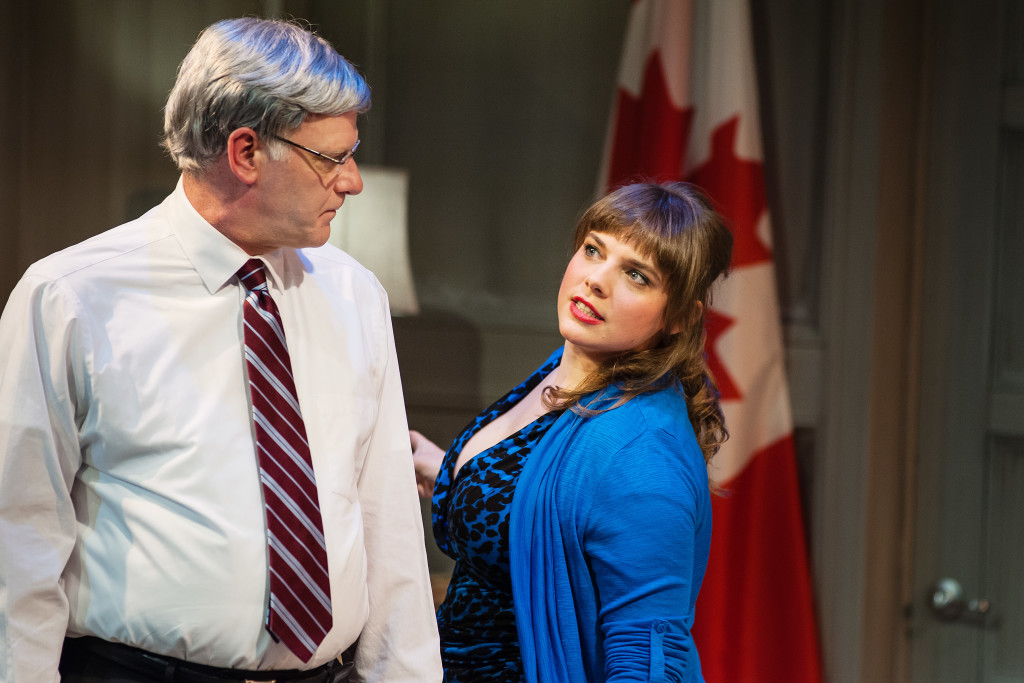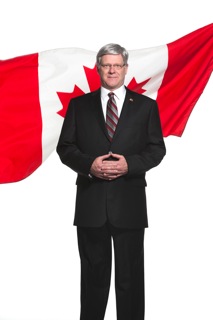Proud has been doing the rounds of Canadian theatre circuits for more than a year now and people have not stopped talking about it. Political plays are hard to come by so it is no wonder that audiences flocked to the Firehall Arts Centre when it hit the town. Having missed a showing last year, I was eager to get in on the action this time around and headed downtown with high hopes. In a state as leftist as British Columbia, where the Liberals are considered conservative, Harper-bashing is the norm. Stop signs have been modified across town to read “Stop Harper”. With this local political climate in mind I went into Proud naively assuming that a Harper-bashing was in store.
Proud is extremely well-written. Healey has done a tonne of research and read all the necessary books. His dialogue is utterly believable. It never looks stupid which would have been an extremely easy trap to fall into given the very specialised setting of the play. The set adds to this credulity. Pam Johnson has erected a spectacular structure with regal looking walls and long elegant windows. A taupe colour scheme flows from the walls to the furniture to the carpet. The setting is accurate and aptly majestic. What strikes you immediately when Andrew Wheeler takes to the stage as the Prime Minister, is his uncanny physical resemblance to the character. Wheeler gets Harper’s posture right and even the distinct Harper smile. He sinks deeper into character as he takes a seat at his heavy desk. Accompanying him is Cary, his assistant, played by Kyle Jesperson, and Jisbella, played by Emmelia Gordon, a new MP who displays problematic, anti-conservative tendencies. With three accomplished actors on board, Healey takes us through a play-by-play of the political tactics that Harper is famous for. The script is never too obvious. The language is political. Facts are abound in the show although truths are bent to serve the creative purposes of the show as well. Jisbella’s character seems to be entirely metaphorical, at times suggesting power, at other times the left wing opposition.
Harper conveniently defeats Jisbella’s rebellious leftist persona as he pacifies her crying son over the phone. Jisbella’s character succumbs to all the stereotypes about women in politics- that they exist in parliament by fluke or by coasting on their sexuality. Women shamefully make up 22% of the country’s 40th parliament. It is difficult to sympathise with Jisbella as she pushes for an anti-abortion bill, having had two abortions herself. We see how no one actually stands for anything in politics, including Harper, so Healey suggests we give Harper a break because all politicians are unethical.
Having once been a resident of Conservative Alberta, the anti-Harper sentiment of BC hit me like a bus as I took my first steps onto Main Street. Proud similarly faces quite the challenge when speaking to this leftist atmosphere. Proud’s Stephen Harper is likeable. He is a regular guy doing the best he can. Healey implies that Harper is destined to be the bad guy no matter what he does. At times, in Vancouver, you forget why you dislike Stephen Harper because to do so is part of the fabric of Vancouver life. Then like me, you Google “Why do we dislike Stephen Harper?” to get reacquainted with your long-held, default beliefs.
Proud is a feather-ruffling kind of play. As a theatregoer I would rather have my feathers ruffled and experience discomfort, than be given run-of-the-mill acceptable, but uninspired fodder. For this reason, Proud is an important work of art. It allows liberals to step back and re-examine their political beliefs. It also gives conservatives a chance to unabashedly celebrate their leader.
There have been scares about lawsuits with Proud, as it does participate in some salaciousness on stage, in terms of Harper’s sexuality. It is difficult to understand how showing a sex scene involving Harper is classified as totally doable, while including more fact-backed left-wing criticism in the show’s discourse is deemed offensive. This imbalance in the portrayal of Stephen Harper works against Proud.
Having what appears to be, a left-wing perspective voiced at the end via Jisbella’s grown son, Jake, Healey conveys the other side of the story. But only somewhat. The concluding speech is rushed and devoid of any hard facts. Harper’s viewpoint is backed by facts at every point in the play. The left-wing isn’t given the same chance. Instead it gets Jisbella’s emotional profanity that doesn’t stand its ground for too long anyways. There is little resolution towards the end and the play lacks a plot. Despite its shortcomings, Proud remains an important watch for BC residents. It serves as a reminder for where we stand with the Stephen Harper. Do we love him or do we hate him? And why? For Healey to show what he has shown in Proud, is nothing short of heroic, as Stephen Harper has been known to hold petty grudges. Still one wishes, that since Healey decided to take this risk in the first place, he might as well have gone all out.
-Prachi Kamble
(Printed with the permission of Fame Blog Canada where it was initially published).


